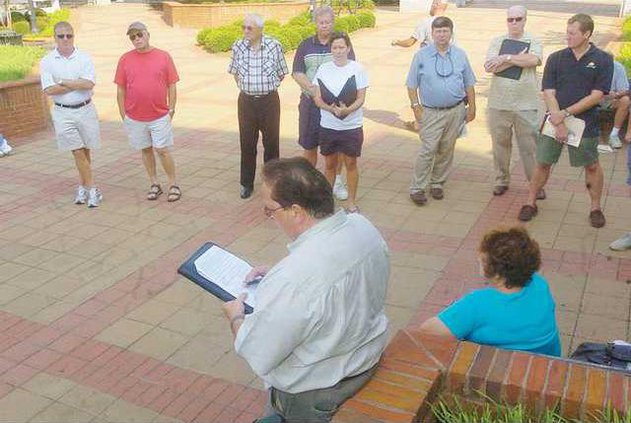Jim Cagle came prepared for the sweltering heat outside the Hall County Courthouse. He brought a folding chair and a towel to wipe his sweat-drenched face.
Cagle works for the Decatur law firm of McCurdy & Candler and conducts public foreclosure sales of property. On Tuesday, he had 21 properties to sell. They were among 168 properties that were advertised in July for August foreclosure.
Before it reaches the courthouse steps, a property has gone through a written process informing the mortgage holder of the breach. It must be advertised for four weeks in the legal organ of the county. In Hall County, The Times serves as the legal organ, and public notices are published each Thursday.
Georgia employs primarily a nonjudicial foreclosure and has one of the fastest procedures in the country.
The property owner gives the mortgage holder a "security deed" or a "deed to secure debt." Technically, until the debt is paid in full, the mortgage holder owns the property and allows the borrower to possess it.
Sales in Georgia always occur on the first Tuesday of the month between 10 a.m. and 4 p.m. and are conducted by an attorney or a representative of the law firm.
It is not an auction in the tradition of the chant and bid. The person conducting the sale has to read the entire legal advertisement, which includes the legal description of the property and the amount of the debt, in its entirety. The document is often multiple typewritten pages.
Typically, the same person who conducts the sale concludes the reading by offering a bid on behalf of the mortgage holder in the exact amount of the debt before asking for other bids.
In better times, real estate speculators might take a chance on a good property with plans to resell it. While there were a number of potential bidders on Tuesday, mortgage holders bought back many properties.
Cagle and others conducting the foreclosure sales seem to take their jobs in stride.
John Gram, a partner in the Gainesville law firm of Whelchel, Dunlap, Jarrard and Walker, said there is no emotional connection to the sales.
"As an attorney, you’re way hardened to that," Gram said. "It’s very cut and dried. People know one thing, if they don’t pay their mortgage they will lose their house."
Gram said much of the authority to conduct the sale is signed by the borrower at closing.
"When you have a closing, there is all kinds of paperwork put before you, much of which is so you don’t have much recourse at foreclosure time," he said. "These days, they are encouraging people who are in trouble to work with their lender."
The laws regulating mortgages vary from state to state. Some states require the sheriff or their representative to conduct the sale. Others require a court order to foreclose.
Some states allow a longer period of time before foreclosure and a few offer opportunities for borrowers to repurchase the property after the foreclosure proceeding.




